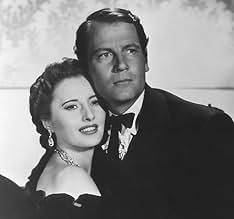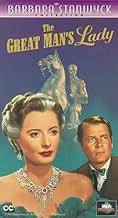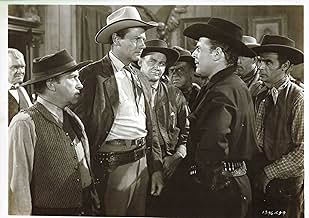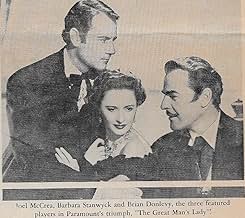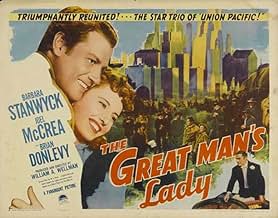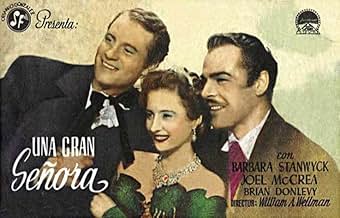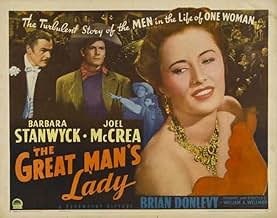A 100-year-old pioneer woman tells her story in flashbacks.A 100-year-old pioneer woman tells her story in flashbacks.A 100-year-old pioneer woman tells her story in flashbacks.
- Awards
- 2 wins total
K.T. Stevens
- Girl Biographer
- (as Katharine Stevens)
Irving Bacon
- Parson
- (uncredited)
Hank Bell
- Man #1 - Hoyt City
- (uncredited)
Monte Blue
- Man #2 - Hoyt City
- (uncredited)
Featured reviews
Fake history, played for bathos. On Founders Day in the thriving metropolis of Hoyt City, eager-beaver reporters swarm the home of a 109-year old woman, reputedly once married to founding father Ethan Hoyt; she's surely got a tall tale to tell, beginning when she was just a teenager in 1848 Philadelphia. Barbara Stanwyck begs, borrows, and barters to finance the future of idealistic husband Joel McCrea, who owns a great stretch of land with nothing on it but a shack. The narrative skitters over such crucial story-elements as railroad access, livestock, a water supply, financial aid--all for the sake of marital melodrama. Brian Donlevy, as a shady gambler who has immediate eyes for Stanwyck, does what he can with a character conceived as an afterthought (he plugs up the holes left behind by a screenplay spanning many years' time); Stanwyck and McCrea fare a bit better, though this story is seldom credible, and is often downright loopy. Production is handsome enough, and the intentions behind the film are apparently heartfelt, but there isn't a surprise in its entire 91 minutes. ** from ****
Unfortunately I found this VHS at Video Vault and took it home. All I can say is that even with William A. Wellman directing, Joel McCrea and Barbara Stanwyck acting, Victor Young doing the music and Edith Head the costumes --- each of these people have made pictures ten times better.
Walt Disney's Thumper taught me years ago, "If you can't say nuthin' nice, don't say nuthin' at all." Therefore, I'll note that Great Man's Lady was better than "Shawshank Redemption" which ranks #2 of all time on this website, better than "Order of the Phoenix" whereby Warner's tossed the 750 page story and made a 2 1/2 hour movie with NO story. Please see Wellman's AAA+ "Little Caesar" or McCrea's "4 Faces West" and skip this one.
Walt Disney's Thumper taught me years ago, "If you can't say nuthin' nice, don't say nuthin' at all." Therefore, I'll note that Great Man's Lady was better than "Shawshank Redemption" which ranks #2 of all time on this website, better than "Order of the Phoenix" whereby Warner's tossed the 750 page story and made a 2 1/2 hour movie with NO story. Please see Wellman's AAA+ "Little Caesar" or McCrea's "4 Faces West" and skip this one.
10SHAWFAN
Such undeserved condescension on the part of most of your reviewers! I thought it was an absorbing romantic drama in which Stanwyck was at her very best. As she turned from youthful sparkly-eyed amused flirt in her first scenes with McCrea into the mature more gray-haired woman seriously urging him to do his political best for those whom he represented, her virtuosity as an actress of transformations came greatly to the fore. It was a pleasure to respond to her in her various moods of youthful love, a stunned mother's loss of her two babies, her vigorous denunciation of her father in his unconscionable request of her, and finally the resignation of old age in which she at last destroys the long-lived marriage certificate she's been carrying around through most of the story.
McCrea was also very good, especially in the scene in which he confesses himself guilty of the same kind of corruption so rife in the American West at that railroad-building time.
The story seemed to echo the true events of The Ballad of Baby Doe (opera) in its background of silver mining and marital troubles; and it certainly resembled Edna Ferber-Abby Mann's Cimarron in retelling the story of a marriage in which the husband spends years on the road away from his wife.
The 19th-century flooding in Sacramento was certainly up to date given the similar events happening in that city in our own times as well.
A great movie. Pay no attention to those detractors.
McCrea was also very good, especially in the scene in which he confesses himself guilty of the same kind of corruption so rife in the American West at that railroad-building time.
The story seemed to echo the true events of The Ballad of Baby Doe (opera) in its background of silver mining and marital troubles; and it certainly resembled Edna Ferber-Abby Mann's Cimarron in retelling the story of a marriage in which the husband spends years on the road away from his wife.
The 19th-century flooding in Sacramento was certainly up to date given the similar events happening in that city in our own times as well.
A great movie. Pay no attention to those detractors.
From the first intro scroll itself, the film shows how dated it is and how stupid it can be with the themes in it. The first half hour went along proving it to me with every character and plot point just fast-forwarding itself to seemingly pointless places. But the rest of the movie, even though doesn't really get out of those aspects gives Barbara Stanwyck a great chance to show her acting prowess and she single-handedly saves the film.
The film can be considered an optimistic look at the tragedy that is any human life. But the privilege of the characters, the lack of feeling any stake even when it is needed and the lacklustre narrative doesn't really help in its philosophy. A lot of the movie, especially the scroll at the beginning and the ending sequence feels like the makers believed it to be something epic when it isn't even remotely close to being that.
Even with all of that and some of the regressive messages, the film believes to be progressive, the film still contains enough to appreciate it for what it is. The movie does portray moments that are representative of how small and yet great life is and Barbara Stanwyck makes it work with her charm and presence. I feel like this same exact story could've been a great film with a better script. I don't know how common this type of story was back then but maybe this film has inspired many other filmmakers afterwards.
The film can be considered an optimistic look at the tragedy that is any human life. But the privilege of the characters, the lack of feeling any stake even when it is needed and the lacklustre narrative doesn't really help in its philosophy. A lot of the movie, especially the scroll at the beginning and the ending sequence feels like the makers believed it to be something epic when it isn't even remotely close to being that.
Even with all of that and some of the regressive messages, the film believes to be progressive, the film still contains enough to appreciate it for what it is. The movie does portray moments that are representative of how small and yet great life is and Barbara Stanwyck makes it work with her charm and presence. I feel like this same exact story could've been a great film with a better script. I don't know how common this type of story was back then but maybe this film has inspired many other filmmakers afterwards.
With the dedication of a statue in honor of the late great Ethan Hoyt(Joel McCrea) happening in the city which bears his name, reporters from all over rush to the home of Hannah Sempler(Barbara Stanwyck), rumored to have once been married to him, to get her opinion and answers to all of their questions. But without giving any meaningful responses, she chases them away. However, one young woman(Katharine Stevens) remains, desperately wanting to write a biography about Hoyt. Hannah brusquely tells her to come back in a hundred years when they are both old women but reconsiders, taking pity on her to start her story when she was a young woman in Philadelphia in 1848 when she runs away with Hoyt to avoid being married to Mr. Cadwallader(Lloyd Corrigan). Aided by excellent performances, especially Brian Donlevy in support, "The Great Man's Lady" is a very entertaining and touching tribute to those pioneers who thought big in building this country from the ground up and sacrificed much along the way. While smartly advocating for privacy and the public need not know every detail, the movie takes the Great Man Theory down a notch by commenting blithely that they could not have done it alone, as dreamers always need a partner to ground them to reality in order for them to fully succeed.(It does not hurt if she can handle a hunting rifle, like Hannah can.) And it is not just feminism that puts this movie far ahead of its time, as it is filmed innovatively with a stunning opening sequence that begins with a shot of the house before panning wider to reveal the city that has risen up around it. Sound familiar?
Did you know
- TriviaOne of over 700 Paramount productions, filmed between 1929-49, that were sold to MCA/Universal in 1958 for television distribution, and have been owned and controlled by Universal ever since. Its initial television broadcasts took place in Los Angeles Thursday 8 January 1959 on KNXT (Channel 2) and in St. Louis Friday 9 January 1959 on KMOX (Channel 4). In Seattle, it first aired 24 July 1959 on KIRO (Channel 7), in Phoenix 8 August 1959 on KVAR (Channel 12), in Milwaukee 27 September 1959 on WITI (Channel 6), in Pittsburgh 26 October on KDKA (Channel 2), in Detroit 29 October 1959 on WJBK (Channel 2), in Toledo 19 December 1959 on WTOL (Channel 11), in Omaha 22 December 1959 on KETV (Channel 7), in Grand Rapids 27 December 1959 on WOOD (Channel 8), in Chicago 29 December 1959 on WBBM (Channel 2), in New York City 26 March 1960 on WCBS (Channel 2), in Minneapolis 9 November 1960 on WTCN (Channel 11), in Philadelphia 22 December 1962 on WCAU (Channel 10), and in San Francisco 3 February 1963 on KPIX (Channel 5). It was released on DVD 27 April 2010 as one of six titles in Universal's Barbara Stanwyck Collection and on 13 July 2015 as a single as part of the Universal Vault Series; since that time, it's also enjoyed occasional airings on Turner Classic Movies.
- GoofsWhen the Hoyts stand at the sight of their future city, they're at the foot of a hill, but moments later they're on top of a hill.
- ConnectionsFeatured in Biography: Barbara Stanwyck: Straight Down the Line (1997)
- SoundtracksUnfinished Symphony
("Symphony 8 in B Major") (uncredited)
Composed by Franz Schubert (begun 1822)
Heard on soundtrack during Janet and Ethan's farewell and under end title
- How long is The Great Man's Lady?Powered by Alexa
Details
- Runtime
- 1h 30m(90 min)
- Color
- Aspect ratio
- 1.37 : 1
Contribute to this page
Suggest an edit or add missing content

